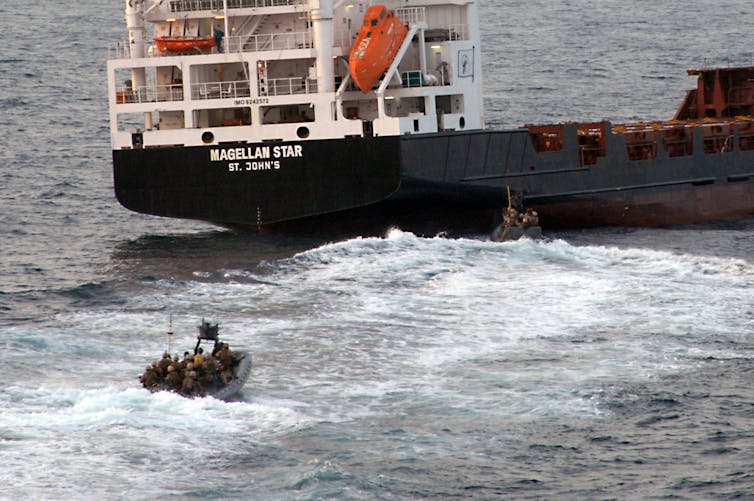 Дата: 10.3.19 | Раздел: Security & safety Inside the ransom business – why kidnapping rarely pays
Most kidnappings take place in countries where governments are weak and territory is disputed. Without a police force able to help, you will need to negotiate to get your loved one back. So, what is the “right” price for their life? When I ask my students this question, their answers range from “I would never pay a criminal or terrorist” to “I’d pay whatever they’re asking for” or “everything I could possibly spare”. Some point to their government’s responsibility to help. Depending on the family’s, employer’s or government’s attitude and means, the kidnappers might make several million dollars here – or nothing at all. In my book “Kidnap: Inside the Ransom Business” I analyse the tricky question of how much to pay using the tools of economics and look at the problem from the perspective of all parties. The kidnappers want to extract the maximum amount of profit, subject to not being caught. If they have time, they will want to probe how much the victim is really worth: starting with a demand beyond their dreams of avarice. Depending on how the victim’s representatives respond, the kidnappers will either revise the ransom upwards or downwards. If they are offered a large amount, say a million dollars, straight away, the kidnappers will believe there is a lot more they can extract. So, the best response to a ransom demand is never to agree immediately to a kidnapper’s demands. If the kidnappers have time, they will keep doubling the price and judge the response to this accordingly. If the kidnappers agree to the first ransom offer they are given, they are probably negotiating from the back of a car and are desperate to return the hostage already. If the victim’s representatives prevaricate, the case will most likely end with the victim withdrawing whatever cash they can from an ATM once before and once just after midnight: the so called “express kidnap” or “millionaire’s ride”. By contrast, a swiftly agreed, overgenerous ransom puts a bulls-eye target on your wider family, your firm’s other employees (if you’re travelling with work), and fellow nationals. News of easy profits spread quickly in criminal communities and can cause local or regional kidnapping booms. The case of Somali piracy is an excellent example. Somalis had hijacked a few ships a year for decades, releasing hostages after a few months for low six-figure sums. Yet when nervous negotiators tried to accelerate this process by offering million-dollar ransoms, Somali piracy escalated and became a threat to global trade. It is therefore in the financial interest of those being issued ransom demands, as well as their moral responsibility, to try to limit the payments. <figure class="align-center "> <figcaption> US marines free a German ship from Somali pirates in 2010. EPA/Christopher Nodine </figcaption> </figure> <figcaption> US marines free a German ship from Somali pirates in 2010. EPA/Christopher Nodine </figcaption> </figure>
Haggling a compromiseGetting the right price requires haggling out a compromise that both satisfies the kidnappers and is affordable (and ethically acceptable) for the victims’ representatives. Economic reasoning tells us where this undignified bartering ends: kidnappers will release when the cost of holding on to the hostage exceeds what they expect to gain from the next ransom increment. Some describe this process as wringing the towel dry: kidnappers squeeze and squeeze until the victim’s representatives stick to their answer, “there is no more”. If those paying the ransom permit the kidnappers to literally squeeze them dry, they will pay all they can afford. But knowing that they will have to endure all the painful squeezes (replete with horrendous threats) anyway, they can also set a lower limit and hide some resources from the criminals. If they stick to their guns, they often achieve a release for a small fraction of the first ransom demand. When foreigners are abducted in a kidnap prone area, there is often another actor and that’s the professional ransom negotiator. For kidnap insurers it is of paramount importance that hostage markets develop norms of non-violence and ways of negotiating ransoms that facilitate swift and reliable releases – while at the same time ensuring that kidnapping is not an easy way to riches. Firms that purchase kidnap insurance for their employees operating in dangerous places are therefore advised and coached in how to handle the ransom negotiation, how to react to threats, and when to stay firm. They learn to barter the kidnappers down to a price that just about covers the costs of staging the kidnap and conducting the negotiation. The result is an orderly but very limited market for foreign hostages in which the crime barely pays. The kidnapping of expatriates, tourists, and foreign firms’ local staff is discouraged by the unhurried, firm approach to negotiations and hostage incidents resolved by professional crisis responders result in the safe return of more than 97% of kidnap victims. For the few cases that go awry, the main problems are pre-existing medical conditions and escape attempts. The vast majority of insured hostage negotiations conclude in less than a week and generally with ransoms that don’t break the bank, keeping other travellers and expatriates safe. By contrast, if people follow their gut instinct, fundraise aggressively, mobilise the media, or lobby politicians to get involved they most likely put their loved one in greater peril and more people at risk. Source: Conversation.comCтатья опубликована на сайте "Безопасность для всех": http://www.sec4all.net Адрес статьи: http://www.sec4all.net/modules/myarticles/article.php?storyid=1777 |